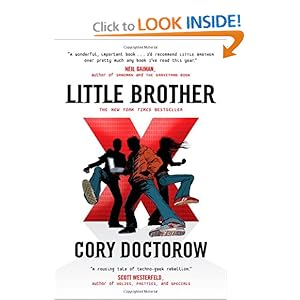
How can one survive in a world full of terrorism without sacrificing their privacy? Are the two mutually exclusive? Does destroying privacy actually make us safer? These are questions our generation and the generation coming up will be dealing with as technology increases and the world becomes more and more hostile. In Cory Doctorow's Little Brother, we see just how quickly things can get out of hand in the name of safety, and you will be impressed by who chooses to stand up for their freedoms!
Marcus has always enjoyed the land of computer games, tech systems, and even Live Action Role Playing games. In particular, he loves finding ways around his high school's borderline illegal security systems that track where the kids are every minute of the day. But when a terrorist attack blows up the Bay Area bridge on the very day Marcus and his friends skipped school for a game, they find themselves on the wrong end of the Department of Homeland Security. They are all swept out of the city and held off-shore for days. Held without lawyers or even a phone call to their parents, the kids realize their rights have become optional in a world of terror.
When Marcus is released, he is told to keep his detainment secret from everyone, including his parents. DHS warns him that they will be watching his every move. Although he is scared, Marcus knows a thing or two about hiding in the digital world. At first he starts using gaming systems and techniques to hide his conversations for safe internet, but as DHS takes more and more control over the city, he realizes how important it is for them to fight back. The adults have been lulled into a complacency by DHS under the assumption that their whittled away freedoms are keeping them safe from more terrorist attacks. But Marcus and the other kids can see what is really happening- without rules, rights, and safeguards, DHS is free to take, hold, and interrogate anyone they want in any way they want. At first they start fighting back in small, mischievous ways, like swapping identities on subway and bus cards, but then they realize this isn't enough. To fight an out of control, lawless government is hard enough, but when the adults all believe in that government, the task becomes that much more difficult and dangerous. But these kids, while they can be scared, refuse to be broken! Big Brother might be watching, but Little Brother fights dirty!
OK, I can admit I am not the most technologically savvy individual. In fact, our IT guy is a good friend and he is frequently frustrated by my lack of tech knowledge, so this book seemed like it would be out of my realm. It is all about systems and understanding how to manipulate them, and my "system" ability is turning on my airport and hoping for the best! But this friend of mine has been talking about this book for weeks, and he doesn't read YA... ever! So I felt compelled to check it out and see what all the fuss was about. And I have to say, I was really impressed! I must admit I didn't understand a blessed bit of the explanations about bypassing systems and creating private systems within a public systems and all the other jargon, but it was explained well enough for me to get it well enough to understand the story. And according to my friend, it is really accurate too! What doesn't actually exist already really could exist (and he has been tinkering around since reading the book to check it out!). So while this book would really appeal to a kid or adult who is interested in the technological aspect of our world today, I think it could appeal to even more people as well.
The most important part of this book, though, is the discussion about privacy. We live in a world where true privacy is hard to achieve and becoming more and more challenging each and every day. The fine line of what people can ferret out about you and what is off limits is perpetually blurry and changing. Our kids don't understand that employers and college admissions offices can see the photos they choose to post on social media sites. They don't realize that a little personal information can open the door to all of their information. And the easiest way to get you to give up your right to privacy? To scare you. After 9/11 we were ready to sign anything if it meant we wouldn't have to experience terror like that again. But does the lack of privacy keep you safe? Or does it allow corruption to thrive and create a whole new level of "unsafe"? These are questions we should be encouraging our students to think about now, because very soon, they will be the generation who makes the decisions about what has the right to be private and what doesn't. As the next generation to take the helm, they need to start thinking about these problems they will face.
And this book gives them clear and present problems with which to think about them through. It is not only current and politically relevant for the world we live in today, it was fun to read and exciting! Marcus was the kind of hero who was thrust into his role, but who takes it seriously. He worries about other kids taking too many risks, but when given the chance to abandon it all, he can't bring himself to do it. I was really impressed by marcus and this book as a whole! I look forward to reading the second book, and I hope to not be so intimidated about the technology I use in the future! (Doubtful, but a girl can dream, right?!)
No comments:
Post a Comment